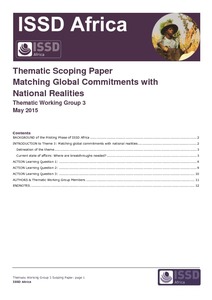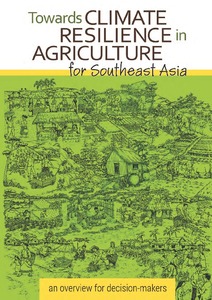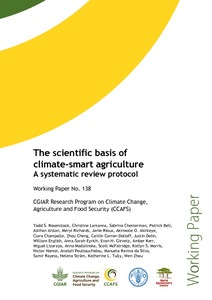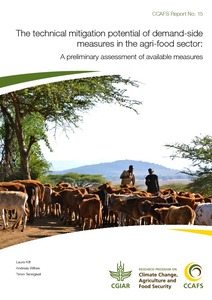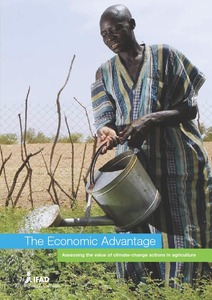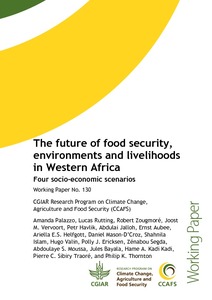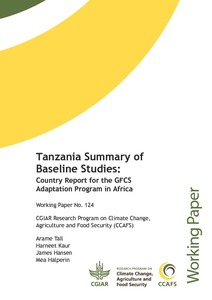Cambio climático
AGROVOC URI:
The Tribe - Platform of participatory local development and management of communal rangeland resources
Sustainable development of pastoral and agro-pastoral systems, dominated by collective and/or tribal ownership of rangelands, is a key issue for the West Asia and North Africa region. These two systems are located in arid and semi-arid areas and are increasingly threatened by desertification process. The policy responses to tackle this complexity have been a sectorial and fragmented, “top-down” approach, putting forward technical solutions and neglecting the social context.
The yield gap: closing the gap by widening the approach
The yield gap has arisen again as a focus for agricultural research to ensure food security and economic growth for farmers around the world. To examine this renewed interest, we carried out a review of key literature in the field of yield gap analysis to identify important gaps in research and analysis. In so doing, both the complexities in yield gap studies emerged along with some significant omissions. Much of the literature and research on the yield gap has been framed by larger concerns and initiatives to raise agricultural productivity.
Towards climate resilience in agriculture for Southeast Asia: an overview for decision-makers.
This sourcebook, and accompanying poster learning series, is aimed at policy makers, planners in government, local research administrators, civil society partners and researchers in Southeast Asia. Compiled and repackaged by Dr. Julian Gonsalves and a resource team, the Climate-Smart Agriculture (CSA) source book draws from a rich pool of literature from over 700 sources. The compilation provides succinct, relevant and timely information about climate challenges, and potential solutions from previously published work in a simplified or a shortened form from around the world.
The Mara-Serengeti Ecosystem and Greater Maasailand: Building the Role of Local Leaders, Institutions, and Communities
Much of the effort to include communities in conservation of large
landscapes has been driven by interests outside the savannas, either by national
governments, NGOs, or foreign conservationists (Neumann 2002,
Brockington et al. 2008). Once included in conservation planning only as
an afterthought, local communities are now major stakeholders. However,
initiatives driven, led, and managed by local leaders, communities, and institutions
to meet the needs of both wildlife and people remain rare. The
The scientific basis of climate-smart agriculture: A systematic review protocol
Background: ‘Climate-smart agriculture’ (CSA)—agriculture and food systems that
sustainably increase food production, improve resilience (or adaptive capacity) of farming
systems, and mitigate climate change when possible—has quickly been integrated into the
global development agenda. However, the empirical evidence base for CSA has not been
assembled, complicating the transition from CSA concept to concrete actions, and
contributing to ideological disagreement among development practitioners. Thus, there is an
The technical mitigation potential of demand-side measures in the agri-food sector: a preliminary assessment of available measures
A number of studies have suggested that addressing greenhouse gas (GHG) emissions from agricultural
production, or ‘supply-side emissions’, will be insufficient to reduce agri-food sector GHG emissions to limit
the increase of global temperatures to well below 2o
C. Recent studies have also suggested that ‘demandside
measures’ related to food consumption, food value chains, and food loss and waste, will be necessary
to reduce emissions and may have a larger technical mitigation potential than supply-side measures.
The Economic Advantage: Assessing the value of climate-change actions in agriculture
This report is aimed at readers who seek to build economic evidence in support of the inclusion of actions on agriculture in climate change plans and programmes, particularly at the national level under the umbrella of nationally determined contributions (NDCs) to the December 2015 Paris Agreement, which aims to restrict a rise in global temperatures and manage risks.
The future of food security, environments and livelihoods in Western Africa: Four socio-economic scenarios
This working paper examines the development of regional socioeconomic scenarios for West Africa’s development, agriculture, food security and climate impacts. We present four globally consistent regional scenarios framed and outlined by regional experts who crafted narratives and determined key drivers of change. Stakeholders identified the type of actors driving change and the timeline of strategic planning as the most uncertain and most relevant factors of change affecting food security, livelihoods and environments in the region.
Tanzania Summary of Baseline Studies: Country Report for the GFCS Adaptation Program in Africa
This report reflects upon the consolidated findings from the baseline and scoping studies conducted under the auspices of Global Framework for Climate Services (GFCS) Adaptation Programme in Africa. It identifies gaps in climate information access and use at the local level, type of climate services farmers and pastoralists need in Tanzania, relevant channels to reach farmers with requested services, lead-time and gender specific requirements.



